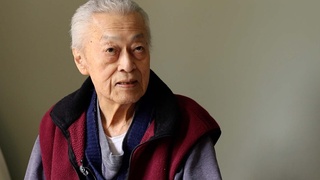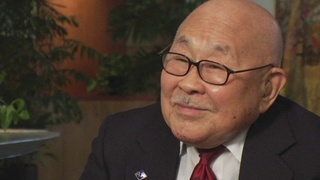Interviews
Questioning Curfew
And, and then one day, I'm dashing home. "Hey Gordon, it's five to eight." I grabbed my stuff and it takes about five minutes to get home so I was just dashing home, and it hit me. A question that I should've faced earlier, just hit me. How come I'm dashing home and all your time keepers are still there? I didn't -- I just needed the question to be raised. I knew I couldn't answer it. You know, without saying, "I can't do it."
I turned around and went back to the library. "Hey, what's, what's the matter?" and I said, "Well, you guys are here." "Well, we got work to do." I said, "I got work to do, too. I decided if you guys are here, I'm gonna, I'm gonna work with you. I'll go back when you guys are ready to go." Nobody turned me in. And I didn't take that until it hit me. And when it hit me I knew, gosh, I can't do it. That's two-faced. The only reason I'm subject to go is because of my -- the way it's stated. I'm a person of Japanese ancestry. In fact, there were, there were Canadians in the group, who weren't even citizens, but they didn't have to go. Well, so I couldn't, I couldn't accept it.
Date: April 26, 1999
Location: Washington, US
Interviewer: Tom Ikeda, Alice Ito
Contributed by: Denshō: The Japanese American Legacy Project
Explore More Videos

Felt no hostility in Los Gatos, California after the war
(b. 1935) Sansei businessman.

Facing housing discrimination in Rhode Island
(1934–2018) Japanese American designer, educator, and pioneer of media technologies

Influence of Mexican culture after returning from camp
(b. 1943) Japanese American transgender attorney

A conversation with a farmer in Kansas
(b. 1939) Japanese American painter, printmaker & professor

Dancing in Japan as an American, in the US as Japanese
(1918-2023) Nisei Japanese kabuki dancer

Discrimination in San Francisco
(1914–2015) Nisei YMCA and Japanese American community leader

Collection of artifacts depicting racial stereotypes influences art
(b. 1939) Japanese American painter, printmaker & professor

Encountering racial discrimination at a public swimming pool
(b. 1923) Nisei from Washington. Resisted draft during WWII.

His testimony has more credibility because of his race
(1922 - 2005) Former U.S. Army counterintelligence officer

Gender discrimination in education field
(1925 - 2018) Nisei educator from Hawai‘i

Learned what it meant to be called “Jap” in Heart Mountain
(1934–2018) Japanese American designer, educator, and pioneer of media technologies

First impression of New York City during war time
(1915 - 2011) Nisei florist who resettled in New York City after WW II. Active in Japanese American civil rights movement

The day Pearl Harbor was bombed
(1922–2014) Political and civil rights activist.

Not bringing shame to family
(1926 - 2012) Scholar and professor of anthropology. Leader in the establishment of ethnic studies as an academic discipline

Past ties to present situation in Middle East
(1926 - 2012) Scholar and professor of anthropology. Leader in the establishment of ethnic studies as an academic discipline
